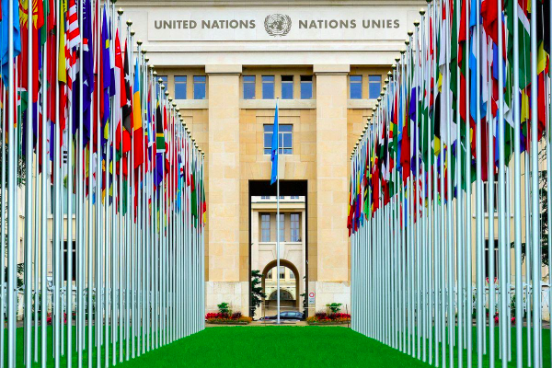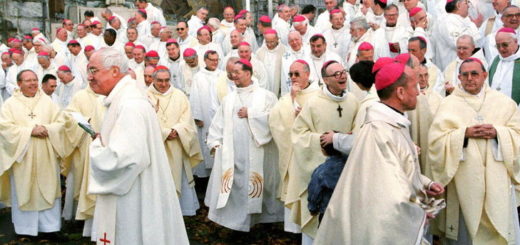Are we Condemned to live in a War-torn World? Rules of Conflict!

H KHASNOBIS, in The Statesman, New Delhi | March 19, 2021
The Geneva Conventions and their Additional Protocols form the core of international humanitarian law, which regulate the conduct of armed conflict and seek to limit its effects United Nations Geneva headquarters. (Photo: iStock)
This article from the Statesman, by the learned writer H KHASNOBIS is published, mainly for our own self-reflection and education.
If norms of warfare (Rules of conflict) had to be codified, and refined time and again by the UN, there lies the unshakable assumption, armed bloody conflicts are inevitable.
A just war?
It led to the conclusion of a “Just War!” by an all holy Catholic church once! What a contradiction and it still is one of the biggest organized religions. Their believers are followers of the first murderer in history, “Cain killing Abel”, and they revel in that religion?
Nay, we should rather say humans, evolved or created are condemned to live here below as “Homo homini Lupus” (man eating man), each one plundering or taking advantage of one’s next door neighbor. Like it or not, that is the overarching fact of history and there can be no augment against facts!
Humans, rational some times!
Of course there is also the ever growing conviction that humans are reasonable creatures, one step above animals, but animal always and rational some times only(Animal semper, rationale aliquando).Once upon a time the Catholic church used to describe its mission, as: humanize, civilize and Christianize those living in the wilds, forests like animals.
Now with Francis Pappa at the helm, the Catholic chuch has made fantastic progress, calling all humanity “All brothers and Sisters” (“Tutti Frattelli”). From the article below we see, he has taken that phrase from Henry Dunant, the great Swiss humanitarian.
War-free world, a Pipe dream?
The writer, below high lights many other phrases like Red Cross, Red Crescent, just war in describing the over hundred years of UN’s struggle for a war-free world in a lterally war-torn world. After reading the article you decide, if a war-free world, is ever possible or will always remain a Big pipe Dream! jameskottoor, editor ccv.
Please read below Khasnobis’ article on a war-torn world!
The United Nations had in 1945 aspired to create a war-free world but people in many parts live in a war-torn world. In the preamble to the Charter, the UN had acknowledged that the two World Wars had brought untold sorrow to mankind and that armed force shall not be used save in the common interest.
Even though war is not an acceptable way to settle differences between states, wars do occur and armed conflicts are a sad reality in the contemporary world. What are the reasons for this contradiction? Answers are not far to seek.
The UN Charter has not completely outlawed the use of force. States retain the rights to defend their sovereignty and territorial integrity, individually or collectively, against attacks on their independence in response to a legal or illegal use of force. Also, Chapter VII of the Charter allows member states the use of force in collective action to maintain or restore international peace and security. Finally, hte Charter’s prohibition of the use of force does not cover internal armed conflicts and civil wars.
The sad conclusion, therefore, is that there is a need for international rules to limit the effects of war on people and property and protect particularly vulnerable groups of persons. That is the goal of international humanitarian law, with the Geneva Conventions and their additional protocols forming an important body of customary law.
Humanitarian law has a long history. The person credited with its conception and application for the protection of war victims was Henry Dunant, a Swiss humanitarian who was an eye witness to the battle of Solferino, fought in Lombardy, northern Italy on 24 June 1859 between the Franco- Sardinian alliance and Austria. It was a decisive battle in the struggle for Italian unification. Dunant who was in the area organised emergency aid services for wounded Austrian and French soldiers helped by local women volunteers. They treated the men equally, regardless of what side they fought on, inspiring them to coin the phrase “tutti fratelli” meaning all brothers.
In 1862, Dunant drew up two proposals intended to relieve the sufferings of soldiers at war: to establish a humanitarian convention and create a permanent aid organisation. In 1864, he founded the Red Cross, and the Geneva Convention came into being. Considered by many as the father of modern humanitarian movement, Dunant was also arguably the first embedded war reporter and citizen journalist rolled into one. For his “supreme humanitarian achievement of the 19th century”, he shared with Frederic Passy the first Nobel Peace Prize in 1901.
The “Convention for the Amelioration of the Condition of the Wounded in Armies in the Field”, signed in Geneva in 1864, laid the foundation of international humanitarian law. This treaty opened up a new perspective: to limit the suffering experienced in times of war by means of an international legal instrument. The Convention provided for the protection of wounded members of armies and those giving them aid.
It required care to be given to the wounded, irrespective of their nationality and granted neutrality to military hospitals and ambulances, medical personnel and civilians aiding them. The text of the convention granted diplomatic recognition to the protective emblem of the Red Cross on a white background. The motto of Red Cross is Inter Arma Caritas, meaning Amidst War, Charity. The humanitarian agency became Red Cross and Red Crescent in 1906 at the insistence of Ottoman Empire. The name Red Crescent is now used in all Muslim countries.
The Red Cross for their humanitarian work of prevention and relief of human suffering received the Nobel Prize for Peace in 1917, 1944 and 1963. The Austro- Prussian war of 1866 and the Franco- German war of 1870 were the first conflicts in which the Geneva Convention was applied. Although the text provided the first components of humanitarian protection, it applied only to a limited category of war victims: the wounded members of land forces. As time went by, new conventions were to remedy the shortcomings which became apparent during subsequent conflicts.
Protection was extended to cover members of naval forces, then to all prisoners of war. However, this process took decades to implement. Wounded, sick and shipwrecked members of the naval forces were covered by the 1899 Hague Convention. Prisoners of war were covered by an international convention drawn up in Geneva in 1929.
The expansion of humanitarian law was thus to lead, in 1949, to the adoption of the four Geneva Conventions which are in force today and were supplemented in 1977 by two Additional Protocols. The International Committee of the Red Cross and Red Crescent is the custodian of the Geneva Conventions and the guardian of International Humanitarian Law which outlines the rules of war. 13 August 2019 marked the 70th anniversary of the landmark Geneva Conventions.
The first three Geneva Conventions did not apply to civilians except for those involved with Red Cross movement. Taking account of the dramatic fate of hundreds of thousands of civilians deported to Nazi concentration and extermination camps, the fourth convention was added for the protection of civilian victims of war. Yet these Conventions did not apply to victims of civil war or to those of new types of conflict, struggles for national liberation and guerilla warfare.
Furthermore, they did not cover direct attacks on civilian populations. To remedy these shortcomings, in 1977, the Geneva Conventions were supplemented by two Additional Protocols relating to the treatment of the victims of international armed conflicts and to the victims of non-international armed conflicts. Almost every state has signed the Geneva Conventions of 1949 and a clear majority of states are already bound by the two Protocols.
Even wars have rules. The Geneva Conventions and their Additional Protocols form the core of international humanitarian law, which regulate the conduct of armed conflict and seek to limit its effects. They protect people not taking part in hostilities and those who are no longer doing so. Serious violations of the Geneva Conventions and Additional Protocols are regarded as war crimes. The law stands on four fundamental principles.
One, persons who are not taking part in hostilities shall be respected, protected and treated humanely without any discrimination.
Two, captured combatants and other persons whose freedom has been restricted shall be treated humanely. They shall be protected against torture and other acts of violence. If put on trial, they shall enjoy the fundamental guarantees of a regular judicial procedure.
Three, the right of parties to an armed conflict to choose methods or means of warfare is not unlimited. No superfluous injury or unnecessary suffering shall be inflicted.
Four, civilian population and civilian objects shall not be the target of military attacks. These four principles and conditions are binding under all circumstances and no derogation is ever possible. In modern humanitarian law, there is no place for discriminatory treatment of victims of warfare based on the concept of “just war”.
The UN has taken a leading role in efforts to advance international humanitarian law. The establishment of the International Criminal Tribunals for the former Yugoslavia and for Rwanda, as well as tribunals in Timor-Leste, Sierra Leone and Cambodia, not only contributed to ensuring accountability but also in strengthening and wider appreciation of humanitarian law.
The elaboration by the preparatory commission for the International Criminal Court of the “elements of crimes” with respect to genocide, war crimes and crimes against humanity, is another tangible contribution in understanding international humanitarian law and protection of war victims.
The goals of human rights law and humanitarian law overlap although their origins are different. Human rights law had its origin in Universal Declaration of Human Rights adopted by UN General Assembly in 1948. Humanitarian law originated in the battlefield as the brainchild of Dunant in 1864. Through a process of change, revision, and broadening of earlier texts and addition of two protocols, it became a comprehensive modern humanitarian law in 1977.
That was a long journey of 113 years. Both humanitarian law and human rights law are designed to restrict the power of state authorities with a view to safeguarding fundamental rights of the individual. Human rights laws supported by customary laws must be applied to all persons and be respected in all circumstances although a number of rights may be suspended in time of emergency. Humanitarian law, however, applies only in times of armed conflicts and special circumstances of warfare. It cannot be abrogated under any circumstances.
Usually humanitarian laws apply across the front line. The armed forces have to respect humanitarian law in their dealings with the enemy and not in relations with their own nationals. In internal conflicts, however, human rights law and international humanitarian law apply concurrently. In other words, humanitarian law is a specialized body of human rights law, finetuned for armed conflicts. Rules of the conduct of hostilities or the use of weapons have no equivalent in human rights law.
Conversely, the political right of individual persons which is an important domain in human rights law is outside the scope of humanitarian law. Despite their overlapping, human rights law and humanitarian law remain distinct branches in public international law. International humanitarian law is inspired by considerations of humanity and mitigation of human suffering. It is designed to balance humanitarian concerns and military necessity and subjects warfare to the rules of law by limiting its destructive effects on humanity.
The law must be respected for survival of human values. Given that the body of law also applies during times of extreme violence and internal armed struggles, implementing the law will always be a matter of great challenge. That said, striving for effective compliance remains as urgent as ever.
















